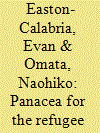| Srl | Item |
| 1 |
ID:
163050


|
|
|
|
|
| Summary/Abstract |
This article provides a critical examination of the current extensive promotion of ‘self-reliance’ for refugees. The existing scholarship largely ignores the unsuccessful historical record of international assistance to foster refugees’ self-reliance and fails to discuss its problematic linkages to neoliberalism and the notion of ‘dependency’. The article reveals that the current conceptualisation and practice of self-reliance are largely shaped by the priorities of international donors that aim to create cost-effective exit strategies from long-term refugee populations. The authors argue that where uncritically interpreted and applied, the promotion of self-reliance can result in unintended and undesirable consequences for refugees’ well-being and protection.
|
|
|
|
|
|
|
|
|
|
|
|
|
|
|
|
| 2 |
ID:
191632


|
|
|
|
|
| Summary/Abstract |
This article examines trends in Uganda’s refugee protection model based on self-reliance and economic inclusion. It does this through a lens of distribution. While self-reliance and economic inclusion are increasingly centralised in the international refugee regime as tools of empowerment that benefit both refugees and their hosts, policymakers largely fail to consider the distribution and availability of local resources in promoting these ideas. Between 2013 and 2018, Uganda experienced a steep rise in the number of refugees within the country. Notwithstanding the global celebration of the Ugandan refugee policy, the empirical data demonstrate an increasingly demanding situation for refugees’ economic lives and ensuing difficulties in pursuing self-reliance. Implementing the Ugandan model without distributive thinking risks detrimental effects even for neighbouring host populations, who are also resource poor. Based on the perspectives of both refugees and host people, the article advances a debate about the efficacy of Uganda’s self-reliance and inclusion policies and concludes by pointing to the risks of framing the current Ugandan model as a ‘success’ for Africa’s refugee protection.
|
|
|
|
|
|
|
|
|
|
|
|
|
|
|
|
| 3 |
ID:
183224


|
|
|
|
|
| Summary/Abstract |
The Dollo Ado refugee camps, located close to the Ethiopian-Somali border, have been a major focus for the United Nations Refugee Agency (UNHCR)'s attempts to build livelihoods for refugees and the host community. The context presents an analytical puzzle: despite the importance of cross-border activity to refugees’ socioeconomic lives, such transnational activity has been institutionally invisible to and hindered by the international agencies seeking to assist them. The article explores how and why refugees’ cross-border activities have been systematically ignored by international institutions. As a theoretical starting point, it draws upon the post-development literature, and notably the work of James Ferguson, which explores how international institutions frequently misunderstand the agency and strategies of their subject populations. However, contra Ferguson's predominantly Foucauldian methodological and epistemologically approach, the article adopts a mixed methods approach, and emphasises the agency of aid workers, bureaucratic politics, and political economy in its account of the disjuncture between international institutions’ state-centric livelihoods programmes and refugees’ own cross-border economic strategies.
|
|
|
|
|
|
|
|
|
|
|
|
|
|
|
|